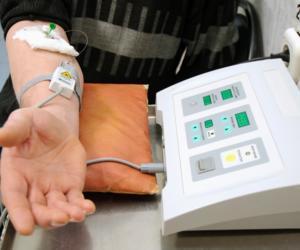“What tests are recommended to confirm rheumatoid arthritis in a person?”
My knees and joints hurt a lot, especially in the mornings. I have a feeling it is rheumatoid arthritis, mainly because my mother had it and I watched her struggle with the same symptoms before she was diagnosed. What tests do I need to confirm a diagnosis? What other symptoms should I be aware of?
7 Answers
RheumatologistRheumatoidArthritis
Main symptoms of concern would be morning stiffness lasting 1 hour or more, pain and swelling of small joints of hands and wrists and marked sensitivity in forefeet
Most patients with RA will have a positive rheumatoid factor lab test and / or a positive CCP test
Remember there are other things that can mimic RA so careful Rheumatology evaluation is important
Most patients with RA will have a positive rheumatoid factor lab test and / or a positive CCP test
Remember there are other things that can mimic RA so careful Rheumatology evaluation is important
A diagnosis of rheumatoid arthritis is made with a combination of clinical history and physical examination along with laboratory tests, and sometimes X-rays. Patients with RA usually have prolonged morning stiffness and afternoon fatigue. The usual joints affected are the fingers and toes. The most helpful laboratory tests are an anti-CCP antibody test along with a rheumatoid factor. Only 10% of patients are negative for both tests. Occasionally, individuals with RA have neck (cervical spine) problems. More information about rheumatoid arthritis and spine problems can be found at thespinecommunity.com
David G. Borenstein, M.D. MACP., MACR.
David G. Borenstein, M.D. MACP., MACR.
Good evening,
Rheumatoid arthritis is the most common form of inflammatory (inflammation associated) arthritis. It is characterized by red hot swollen and inflamed joints; it is typically symmetric and affects the smaller joints such as the knuckles, wrists, ankles and feet although large joints can be involved. It is diagnosed based on relevant clinical findings on history and exam and there are some blood tests that are done to confirm the diagnosis although it is important to realize that blood tests can also be falsely abnormal so the blood tests themselves are not helpful just by themselves. The blood tests done for RA including two specific antibody tests called the Rheumatoid factor and the CCP antibody although other blood tests such as a routine CBC and ESR may also have clues to a diagnosis of inflammatory disease.
I hope the above information is helpful and if you do have concerns I would urge you discuss this with your primary physician to assess further and possibly refer you to a rheumatologist for relevant assessment as early diagnosis is an important factor in preventing permanent joint damage.
Mishal Abdullah.
Rheumatoid arthritis is the most common form of inflammatory (inflammation associated) arthritis. It is characterized by red hot swollen and inflamed joints; it is typically symmetric and affects the smaller joints such as the knuckles, wrists, ankles and feet although large joints can be involved. It is diagnosed based on relevant clinical findings on history and exam and there are some blood tests that are done to confirm the diagnosis although it is important to realize that blood tests can also be falsely abnormal so the blood tests themselves are not helpful just by themselves. The blood tests done for RA including two specific antibody tests called the Rheumatoid factor and the CCP antibody although other blood tests such as a routine CBC and ESR may also have clues to a diagnosis of inflammatory disease.
I hope the above information is helpful and if you do have concerns I would urge you discuss this with your primary physician to assess further and possibly refer you to a rheumatologist for relevant assessment as early diagnosis is an important factor in preventing permanent joint damage.
Mishal Abdullah.
Great question! Historically, a key blood test to determine whether a person has rheumatoid arthritis checked for the presence of rheumatoid factor (RF): antibodies produced by the immune system that can attack healthy joints and tissues. More recently, an additional antibody called the anti-cyclic citrillunated protein (ACPA) has been considered a marker.
But now, the presence of RF or ACPA is no longer considered necessary for a rheumatoid arthritis diagnosis. When RF and ACPA are negative, but a person has symptoms similar to those of rheumatoid arthritis, seronegative arthritis can be diagnosed. People who have either RF or ACPA antibodies have seropositive RA. In either case, i would advise you to follow up with a Rheumatologist for further evaluation as there can be many different causes for your symptoms and it should be evaluated by a healthcare professional.
But now, the presence of RF or ACPA is no longer considered necessary for a rheumatoid arthritis diagnosis. When RF and ACPA are negative, but a person has symptoms similar to those of rheumatoid arthritis, seronegative arthritis can be diagnosed. People who have either RF or ACPA antibodies have seropositive RA. In either case, i would advise you to follow up with a Rheumatologist for further evaluation as there can be many different causes for your symptoms and it should be evaluated by a healthcare professional.







